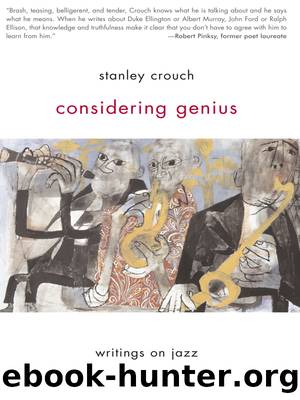Considering Genius by Stanley Crouch

Author:Stanley Crouch [STANLEY CROUCH]
Language: eng
Format: epub
Publisher: Basic Civitas Books
Published: 2011-11-30T16:00:00+00:00
Part III: The Democratic Swing of American Life
In 1938, the great German novelist Thomas Mann, who had fled Nazism in his homeland, delivered a lecture from one end of America to another that was published as a small volume under the title The Coming Victory of Democracy. It is only sixty-five pages in length, and there are a few aspects of it that are now outdated, but the overall sense of the world and the observations Mann provides about democracy connect very strongly to the processes and the implications of jazz, which brings a fresh confluence of directness and nuance not only to the making of music but to the body of critical thought its very existence has challenged in vital ways that are peculiarly American.
The vision of jazz performance and the most fundamental aspects of its aesthetic are quite close to Mann’s description of democratic thought: “We must define democracy as that form of government and of society which is inspired above every other with the feeling and consciousness of the dignity of man.” The demands on and the respect for the individual in the jazz band put democracy into aesthetic action. Each performer must bring technical skill, imagination, and the ability to create coherent statements through improvised interplay with the rest of the musicians. That interplay takes its direction from the melodic, harmonic, rhythmic, and timbral elements of the piece being performed, and each player must have a remarkably strong sense of what constitutes the making of music as opposed to the rendering of music, which is what performers of European concert music do. The improvising jazz musician must work right in the heat and the pressure of the moment, giving form and order in a mobile environment, where choices must be constantly assessed and reacted to in one way or another. The success of jazz is a victory for democracy, and a symbol of the aesthetic dignity, which is finally spiritual, that performers can achieve and express as they go about inventing music and meeting the challenge of the moment.
Those challenges are so substantial that their literal and symbolic meanings are many, saying extraordinary things about our collective past as well as the dangers and the potential of the present. In fact, improvisational skill is such an imposing gift that the marvelously original Albert Murray has written in The Hero and the Blues: “Improvisation is the ultimate human (i.e., heroic) endowment.” The very history of America’s development bears this out, as does much of the history that preceded it. But perhaps no society so significant has emerged over the last five centuries that has made improvisation so basic to its sensibility. Even the conflict between Hernando Cortés and the Aztecs, for all its horrific dimensions, pivoted on the element of improvisation. As the French writer and critic Tzvetan Todorov observes in his startling The Conquest of America: “It is remarkable to see Cortés not only constantly practicing the art of adaption and improvisation, but also being aware
Download
This site does not store any files on its server. We only index and link to content provided by other sites. Please contact the content providers to delete copyright contents if any and email us, we'll remove relevant links or contents immediately.
The Light of Days by Judy Batalion(827)
The Crime Book by DK(703)
Chasing the Thrill by Daniel Barbarisi(653)
1312, Among the Ultras by James Montague(585)
The Doctor Who Fooled the World by Brian Deer(565)
Till Murder Do Us Part by James Patterson(557)
Invention by James Dyson(557)
E.R. Nurses by James Patterson(557)
The Complete Correspondence 1928-1940 by Theodor W. Adorno & Walter Benjamin(503)
Climb by Susan Spann(487)
Mind Games by Neville Southall(478)
Space 2069 by David Whitehouse(473)
The Dream Architects by David Polfeldt(473)
The Reporter by Mark Paul Smith(472)
Surely you Ìre joking, Mr Feynman by Richard Feynman(457)
If You Should Fail by Joe Moran(441)
Masterful Marks: Cartoonists Who Changed the World by Monte Beauchamp(429)
The 'Wolfman' by Sigmund Freud & Sigmund Freud(427)
Banking and Beyond by Unknown(421)
